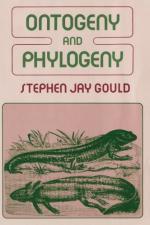|
This section contains 640 words (approx. 3 pages at 300 words per page) |

|
Ontogeny describes the entire life history of an organism from fertilization to death. It includes not only embryonic and prenatal development but also postnatal growth and development.
That patterns of ontogeny can provide fascinating insights into evolutionary history has long been recognized. Possibly the most famous concept linking the two areas is the "biogenetic law" of German biologist Ernst Haeckel (1834-1919), which states that "ontogeny recapitulates phylogeny." Haeckel suggested that, in the course of its development, each organism recapitulates (repeats the stages of) its entire phylogenetic history by taking on the morphologies of all of its ancestors sequentially, from the most primitive ancestor to the most advanced. Haeckel favored a fairly stringent interpretation of the biogenetic law, and spent considerable time identifying the ancestors represented by different developmental stages. For example, he viewed the gastrula stage (an early embryonic stage during which the three embryonic tissue layers are...
|
This section contains 640 words (approx. 3 pages at 300 words per page) |

|


